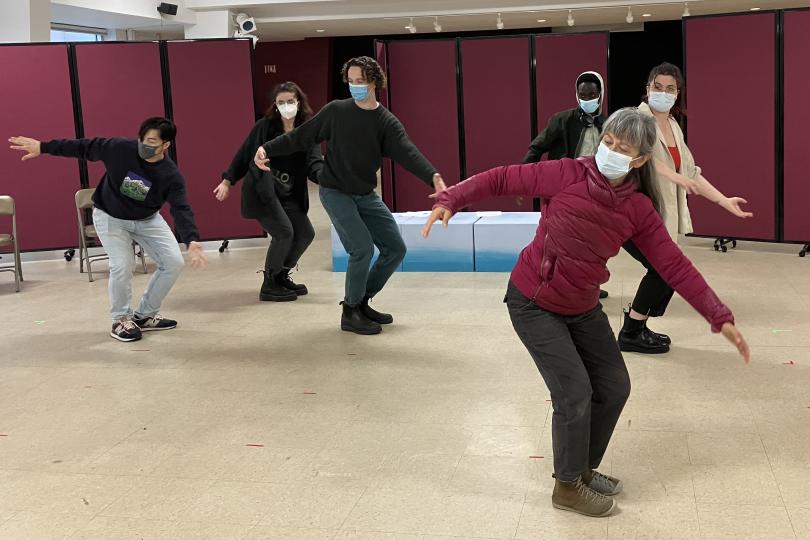A hunger for precedent

Kit Bix interviews Director Martha B. Johnson about Full Circle Theatre Company’s upcoming production of ANTIGONICK by Anne Carson
KB: In addition to being an internationally admired poet, Anne Carson is classicist and translator. Antigonick is Carson’s “translation” or re-invention of Sophocles’ tragedy, Antigone. What made you choose this play as your next production?
MJ: As co-founder and core artist with Full Circle, I proposed this play because of my passionate love for Carson’s translations and for Antigonick in particular. I love the way Carson created Antigonick, how it emerged from her brilliant insights into Sophokles’ original genius as a writer of Antigone in Greek, and how she then translated his genius into stunning contemporary, poetic language, imagery, and authentic human situations. One can clearly see in Antigonick why her translations are described as “startling”: Where else can one find this combination of utter command of ancient Greek language plus outstanding ability as a contemporary poet?
And it’s interesting to note that Carson insists that Antigonick is not a re-invention or a rewriting of Antigone but is truly a translation of Sophokles’ Greek text. And in my mind, however audacious and free-wheeling her Antigonick is, Carson has excellent reasons to argue this. She lists Sophokles as its author in both published editions and insists that producers of Antigonick list her as translator and Sophokles as author. (See footnote at bottom)
Full Circle chose this play because of the many ways that it supports our company’s mission and core values, particularly the play’s message of the tremendous importance of standing up to injustice through word and action.
KB: Daphne Merkin has called Carson “one of the great pasticheurs.” Antiogonick is heavily metatextual and very much a pastiche: Carson brings in and sometimes juxtaposes allusions to scholarly interpretations and prior translations of the play; she switches from dark meditations to parody and from dark humor to fragmentary poetic images. I’m wondering if Carson’s style of storytelling, with all its fragments and commentary and discontinuities, presents special challenges for a director?
MJ: Great question, and in facing these clearly-present challenges of Antigonick, I somehow feel that we’re actually lucky, because we’ve been discovering, embedded in the play, one great thing that unifies the apparent pastiche of elements you describe: Anne Carson’s distinct contemporary sensibility–a sensibility that somehow remains intimately connected to Sophokles at all times. There is an Antigonick chorus line referring to Antigone: “all the tall mountains of her mind,” and as I work with this cast as a director, I often think: “We’re all climbing the tall mountains of Anne Carson’s mind.”
One could certainly say that Antigonick is a pastiche. But it’s a special kind of pastiche that somehow forms a powerful and unified work of art in ways that are ultimately generated by Carson’s mind, as well as Sophokles’ mind, everywhere in this play. The cast members and I have been swimming in her mind and brilliant words, and in this she is exactly like Sophokles and his original Antigone, because he too created a great sea from his Greek mind with this earlier Bronze Age story for his contemporary audience.
The metatextual elements, the sudden shifts in tone, the fragmentary poetic images are challenging indeed. But we’re finding interesting solutions, inspired by these overreaching unifying principles.
KB: What are some other challenges you’ve found in staging this play?
MJ: Partly because of the inherent challenges of the play, including a Greek chorus in most scenes, as well as the silent movement character Nick, and partly because of complex movement sequences we’re using to amplify the Antigone story (combat, dance, pantomime), and also because of some double and triple casting of actors, it’s been quite challenging to figure out the timing for building all of the complex elements of this piece. However we’re now at the point that all these things are coming together into a whole, which is quite exciting to experience for us all.
KB: The Guardian describes Anne Carson as “a poet interested in those moments when precedents can't be found and normal translations fail.” In the play Carson underscores those moments when precedents are lacking. It made me think of how frequently we hear the word “unprecedented” used during the past five years, in response to things like the Pandemic and the January 6th Insurrection. Does this play speak especially to this moment, to these times when we search for, or even hunger for, precedents?
MJ: Yes, there clearly will be powerful resonance in this play with the “unprecedented” acts we’ve had to experience in the past five years.
In both Antigone and Antigonick, Kreon, as a new king, carries out two significant unprecedented acts that violate moral and ethical laws, and that would have been as shocking and unacceptable to the ancient Greeks as they are to us today: First, he issues an edict refusing burial to Antigone’s warrior brother, Polyneikes, with a sentence of death for anyone attempting this burial. Then after Antigone’s capture, Kreon devises a shockingly unusual, unheard of death sentence: to bury Antigone alive in a cave. For the Greeks, Kreon here is clearly acting like a dictator who is violating both his position of power and the higher laws of humanity and the gods.
In Antigonick Carson clearly emphasizes the unprecedented nature of Kreon’s acts and Antigone’s equally unprecedented actions of defiance, so unusual for a woman. And I believe that both Kreon’s heinous actions, and Antigone’s courageous standing up for justice and truth, will have a powerful resonance with audiences.
KB: Carson wrote about the disappearance and death of her brother, Michael, in Nox, which is one of her most widely acclaimed works. Antigone (and so Antigonick) begins with the burial of a brother. Do you see any connection between the two works and Carson’s treatment of the mourning of a sibling in Nox?
MJ: I did wonder whether there was any connection for Carson between Nox and Antigonick, when I first read and later reread them, particularly since I happened to have lost my own brother around the same time Carson wrote Nox and Antigonick. However in a 2012 interview with Andrew David King, Carson pushes away any intended connection between these two works. But for myself it’s still powerful to connect the theme of brother-loss found in the two works.
particularly the play’s message of the tremendous importance of standing up to injustice through word and action.
KB: The “Nick” in Antigonick refers to the phrase “nick of time,” which makes one think of a sudden save or turn of events – as when someone is “saved in the nick of time.” But, in the context of a Greek tragedy, the word seems almost like a cruel reminder of the inevitability of events, fate, or the will of the gods, etc. In the play, Carson actually creates a character called “Nick.” Can you tell us something about Nick and why you think Carson created this new character? Or what you think Carson is trying to convey with this idea?
MJ:Yes, I too think that Carson is using the term “nick of time” very ironically, but for me this cruel reminder is tied to Kreon’s free will, rather than to inevitability or fate. The play’s tragedy arises when Kreon misses his ‘nick of time’ moment, that precious moment when he could have saved Antigone, his son Haimon, and his wife Euridike, a moment prophetically offered to him by Teiresias.
And as you say Carson introduces an entirely new and unique character into Antigonick: “Nick,” cryptically described in her list of characters as: ‘a mute part [always measuring things]. After reading various things said or written by Carson about Nick, it seems she’s introduced Nick mainly because of the incredible importance of the passage of time, and the timing of events in Antigone, and the horrendous results of Kreon’s learning wisdom and insight too late.
It’s been wonderful working with dancer/choreographer Sandy Agustin, who is playing the role of Nick, and who remains on stage for nearly the entire play, measuring time and other “things.”
KB: I’m an ardent fan of Full Circle for many reasons, one of which is the company’s devotion to inclusive casting. Could you talk about the cast of this play and how you went about assembling the company ?
We’re thrilled you’re an ardent fan, and thank you!
Assembling our wonderful cast began over a year and a half ago when I reached out to Oogie-Push (a citizen of the Meskwaki Nation), with whom we’ve worked before, to invite her to play the role of Antigone. We then held auditions last November, inviting several actors with whom we’ve worked before to participate. The overall audition response (advertised in Minnesota Playlist) was tremendous: We ended up auditioning around 140 actors, from whom we selected a highly talented, multi-identity cast of 13 actors plus 2 understudies.
An interesting story is that we reached out to Interact Theater in search of an actor with impaired vision to play the role of the blind prophet Teiresias, and we were lucky enough to find Daniel Mauck, who was interested in our production of Antigonick, but was unable to participate in all the rehearsals/performances. So we came up with an alternative proposal, for Daniel to record the voice of Teiresias. He accepted and created a powerful recorded voice for this role, that will be corporally interpreted by actor Dominique Jones.
Antigonick performs May 17-June 4, 2023 at Mixed Blood Theatre. (May 17-19 Previews. May 20 is Opening Night). For tickets visit Full Circle's Website.
Footnote: Anne Carson's reply when an interviewer asked her why she’d “rewritten” Antigone: “To be honest, I don't see any ‘rewrite’ going on. Everything I've done in the translation is an attempt to convey a move or shock or darkening that happens in the original text. This doesn't always mean reproducing the words and sentences of the original in their same order; but a play is (note etymology of ‘drama’ from Greek DRAN ‘to do or act’) a collection of actions or doings, this is what needs to be rendered from Greek into English. It's true Sophokles doesn't mention Hegel on the first page of Antigone, but he does refer to the long tradition of Antigone's catastrophic family in order to remind his Greek audience of the legend and for us, in 2012, the Antigone legend includes Hegel. . .” –Interview with Alex Dueben, 2012.




